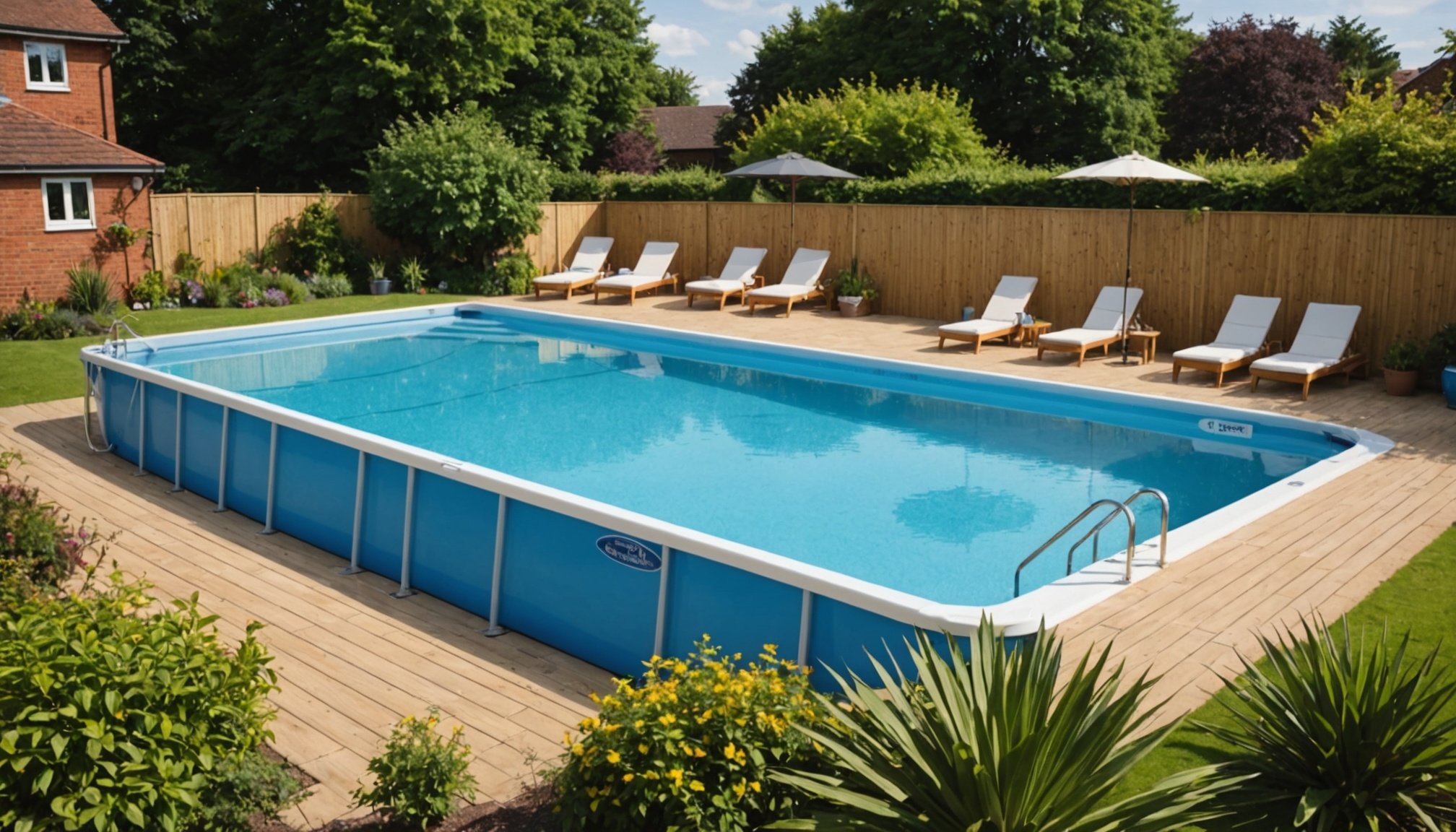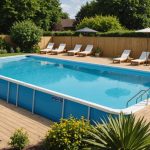Overview of Pool Filtration Systems
Effective pool filtration systems are crucial for maintaining swimming pool hygiene. An efficient filtration system removes debris, particles, and contaminants, ensuring clean and safe water. In the UK, where weather conditions can vary, keeping a pool well-maintained demands diligent swimming pool maintenance practices.
Several types of filtration systems are commonly available in the UK, each serving different needs based on pool size, usage, and environmental conditions. Sand filters are popular for their ease of maintenance and ability to handle large volumes of water. Cartridge filters, on the other hand, offer finer filtration and are favored for smaller, residential pools. Lastly, diatomaceous earth (DE) filters provide the most thorough cleaning, though they require more frequent upkeep.
A lire aussi : Exploring the Environmental Consequences of Saltwater Pool Systems in UK Homes
When selecting a filtration system, it’s important to consider factors such as cost, efficiency, and ease of maintenance. The choice often depends on the pool owner’s commitment to UK pool care and their preferred level of interaction with the maintenance process. Crucially, understanding the specific needs of your swimming pool will guide you in choosing the most appropriate filtration system.
Types of Filtration Systems
Swimming pool filtration systems are essential for maintaining clean and safe water. Three primary types of pool filters are utilised: sand filters, cartridge filters, and Diatomaceous Earth (D.E.) filters. Each filtration system offers unique advantages and suitability for various pool settings.
A lire également : Maximizing Rainwater Harvesting: Innovative Ways to Power Your UK Home Swimming Pool
Sand Filtration Systems
Sand filters are among the most common types of filtration systems. They work by circulating pool water through a sand bed, which traps debris and course particles. Pros include low maintenance and durability. Cons are less efficient in trapping very fine particles, sometimes requiring supplementary cleaning.
Cartridge Filtration Systems
Cartridge filters use a pleated cartridge to remove finer particles from the pool water efficiently. These systems offer excellent clarity and require less frequent backwashing than sand filters. However, the cartridges need regular cleaning and occasional replacement, which can increase maintenance costs.
Diatomaceous Earth (D.E.) Filtration Systems
D.E. filtration systems use a powder made from fossilised algae to trap even the tiniest particles, providing superior water clarity. However, D.E. filters can be costlier and require more maintenance due to the need for periodic backwashing and recharging with D.E. powder. Despite their expense, they are optimal for larger or heavily used pools.
Key Features to Consider
Choosing the right pool filter can greatly impact both the clarity of your pool water and the overall efficiency of maintaining your pool. One of the foremost features to look at is the filtration capacity. A filter with sufficient capacity will effectively capture debris, ensuring your water is clear and inviting. The relationship between filtration capacity and water clarity is direct; the higher the capacity, the better the filter can handle larger particles and continuous usage.
Another crucial consideration is energy efficiency. Efficient systems not only reduce your carbon footprint but also significantly cut down on electricity costs over time. An energy-efficient filter can lead to substantial savings while maintaining optimal performance levels.
Ease of maintenance is just as important as capacity and efficiency. Different systems come with varying upkeep requirements. For instance, while some filters demand regular backwashing or cartridge replacements to function efficiently, others operate with minimal intervention. Understanding the maintenance needs of your chosen system can save you time and effort, allowing you to focus on enjoying your pool.
Comparison of Leading Filtration Brands
Selecting the right pool filter is crucial for maintaining a clean and healthy swimming environment. This section delves into some of the best pool filter brands available, evaluating their effectiveness and features.
Top Brands for UK Swimming Pools
The UK market offers several renowned brands that have consistently received positive brand reviews. Leading companies such as Hayward, Pentair, and Intex are well-regarded for their filtration effectiveness. These brands provide a range of filters suitable for different pool sizes and types, ensuring optimal water clarity and hygiene.
Product Comparisons and Features
When comparing products, it’s essential to consider features such as ease of maintenance, energy efficiency, and advanced filtration technology. For instance, Hayward is known for its robust construction and efficient cartridge systems, while Pentair offers innovative multi-speed pump options. Intex, on the other hand, is appreciated for its affordability and simplicity, making it ideal for smaller pools.
Customer Ratings and Feedback
Customer satisfaction varies across brands, with Hayward receiving high praise for durability and performance. Pentair is often recommended by industry experts for its quiet operation and eco-friendly designs. Intex garners positive feedback for outstanding value, especially among budget-conscious consumers. Furthermore, each brand incorporates unique features that cater to specific consumer needs, such as easy-to-clean filters or minimal energy consumption. Understanding these aspects can help you make an informed choice.
Costs Associated with Filtration Systems
When considering a pool filtration system, understanding the pricing and the overall financial commitment is crucial. The initial purchase price is a significant part of the investment. However, long-term expenses often outweigh the upfront cost due to ongoing maintenance and the necessity of periodic upgrades.
Initial Costs
The purchase price for a pool filtration system in the UK varies widely, affected by the type and model of the system. Factors such as size and brand can significantly influence these costs. Installation expenses can also vary due to site-specific factors such as complexity and location.
Ongoing Maintenance
The commitment doesn’t end with the initial purchase and installation. Regular maintenance is essential to ensure optimal performance. This involves recurring costs like filter replacements and chemical treatments, which can add up over time.
Budgeting for Upgrades
Occasional upgrades are required to enhance efficiency or comply with new regulations. Planning for these is essential for sustainable financial management. Factor in potential costs for components that may need replacement or enhancement to avoid unexpected expenses.
By considering these components, you can develop a comprehensive understanding of the financial implications associated with pool filtration systems.
Maintenance Tips for Optimal Performance
Maintaining your pool filter is crucial for ensuring operational efficiency and longevity. Regular attention can prevent costly repairs and keep your pool sparkling clean.
Routine Maintenance Practices
Routine maintenance is a key element in achieving best results. To maintain pool filter efficiency, ensure to clean the filter at least once a month. Use a gentle hose spray to remove debris without damaging the filter material. For cartridge filters, manufacturers recommend replacing every 1-2 years for optimal performance.
Troubleshooting Common Issues
Even with regular care, issues can arise. A decrease in operational efficiency often signals a problem. If you notice cloudy water or reduced circulation, it might be time to inspect your filter. Cleaning or backwashing the filter can resolve many problems. If issues persist, replacing the filter or consulting a professional might be necessary.
Seasonal Adjustment Tips
Seasonal changes, particularly in the UK climate, affect filter operational efficiency. During autumn, more frequent cleaning might be needed due to increased debris from leaves. In winter, if your pool remains open, running the filter during off-peak hours can save on electricity costs while maintaining water quality. Adjusting maintenance routines to the season ensures the system runs smoothly year-round.
Recommendations for Specific Pool Types
Selecting the best filters is crucial for maintaining crystal-clear water across various pool types. When choosing a filter for above ground pools, it’s essential to opt for systems designed to handle smaller volumes and easier maintenance. These pools often benefit from cartridge filters due to their user-friendliness and low-pressure requirements.
For in-ground pools, the situation differs. These require robust systems capable of managing larger water volumes. Sand filters are a popular choice, offering durability and efficiency for residential setups, while commercial pools might necessitate high-rate sand or DE filters for enhanced performance.
Hot tubs and spas demand specialized filtration solutions due to their unique size and water usage patterns. Here, cartridge filters shine again, providing fine filtration necessary to maintain hygiene in these compact environments.
When adapting filtration systems for different installations, consider the specific requirements. Above ground pools typically involve easier access, making installation and maintenance straightforward. In-ground installations, however, may require more complex plumbing and electrical connections, requiring professional assessment.
Ultimately, understanding the unique demands of each pool type and its usage will guide you toward the most effective filter selection, ensuring water clarity and sanitization with minimal effort.











